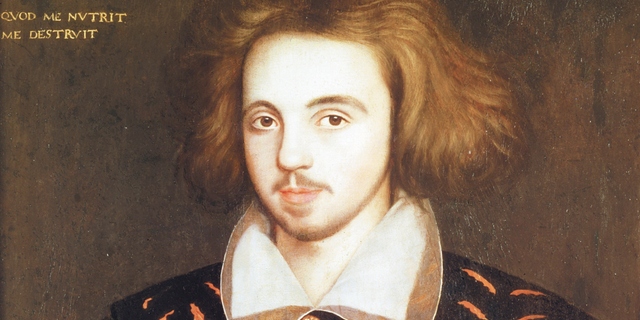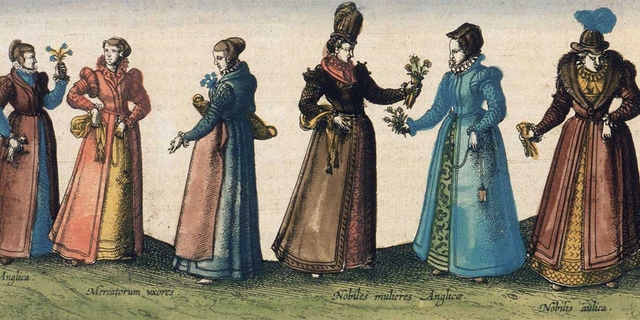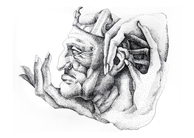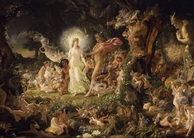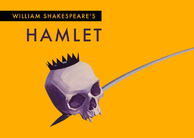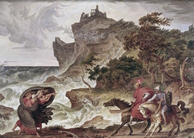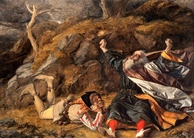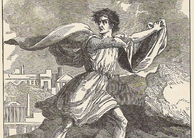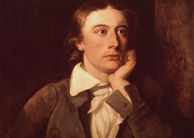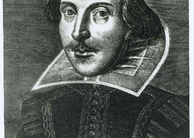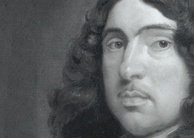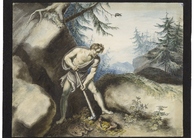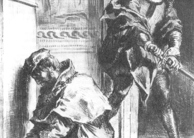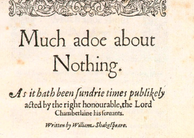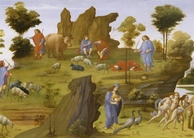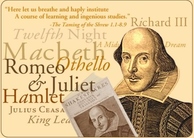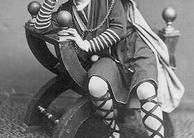|
Shakespeare (tagged articles)
The keyword Shakespeare is tagged in the following 43 articles.
2021, Vol. 13 No. 03
In recent years, questions of racial, religious, and sexual inequalities across classic literature have left many educators and students wondering if the canon of Western works are sufficient in portraying the many diverse peoples that existed during... Read Article »
2021, Vol. 13 No. 01
The inescapability and influence of the past becomes most discernable with homecoming. A particularly powerful sense of nostalgia concentrates in textiles, especially when these objects purposefully invoke the past. More often than not, theatre... Read Article »
2020, Vol. 12 No. 10
This paper argues that film is a medium defined by its relationship to memory. Building upon aesthetician György Lukács's temporal theory of cinema, I contrast film's inherent relationship to memory with the “eternal present&rdquo... Read Article »
2020, Vol. 12 No. 09
When finally, … Richard dashes the mirror to the ground, there shatters not only Richard’s past and present, but every aspect of a super-world … The features as reflected by the looking glass betray that he is stripped of &hellip... Read Article »
2020, Vol. 12 No. 09
This paper analyses Ian McEwan’s reuse of Shakespeare’s material in his retelling of Hamlet from the unusual point of view of an unborn child. By considering its plot, characters, setting and main issues, McEwan’s novel Nutshell... Read Article »
2017, Vol. 9 No. 11
I was the wounded soldier in the opening scene of Macbeth, lying spread-eagled on the stage, flaunting my unsightly gashes. I closed my legs self-consciously. Even portraying a hyper-masculine character, I found myself subject to the parameters... Read Article »
2017, Vol. 9 No. 05
The fascination with death and the sensationalizing of suicide are prevalent metaphysical themes which traverse all Shakespearean tragedy. These brooding themes, despite their ubiquitous portrayal, take on an idiosyncratic ethical meaning in King... Read Article »
2017, Vol. 9 No. 02
Commonly believed to be the single greatest writer and poet of the English language, as well as one of the most distinguished and esteemed dramatists in the entire world, William Shakespeare is credited with authoring approximately 38 works of theatre... Read Article »
2017, Vol. 9 No. 01
Although he is arguably best known for his tragedies exploring emotions associated with familial obligations, the need for revenge, and overwhelming ambition, English poet and playwright William Shakespeare penned numerous lines of verse and multiple... Read Article »
2016, Vol. 8 No. 11
Never has a work of Shakespeare courted such controversy amongst critics than The Life of King Henry V. ‘By far the most controversial of the histories’, writes Berry, 'Henry V remains at the centre of a long-standing critical debate... Read Article »
2015, Vol. 7 No. 06
In William Shakespeare’s Hamlet, Prince Hamlet’s polysemic language raises the theme of empowerment of the body politic and, ultimately, the notion of democratization. Through an analysis of Hamlet’s speech, particularly in response... Read Article »
2015, Vol. 7 No. 03
Anti-semitism was a prevailing cultural sentiment in Europe, particularly in Great Britain, during the period when some of English literature's most celebrated figures, including Marlowe, Shakespeare, Donne, and Chaucer, penned their famous works... Read Article »
2012, Vol. 4 No. 09
William Shakespeare's King Lear begins with Lear ignoring the natural order of family inheritance by deciding to divide his kingdom amongst his three daughters before his death.. Typical of human nature, Lear is swayed by the sycophantic flattery... Read Article »
2012, Vol. 4 No. 01
In Seneca's tragedies, the Roman playwright and philosopher employed the concept of fate and fortune to structure the outcome of characters' lives. Frederick Kiefer notes in Fortune and Elizabethan Tragedy that the Senecan chorus primarily discusses... Read Article »
2011, Vol. 3 No. 11
In Plautus’ Roman Comedies, the stock character of the slave employs mistaken identity or a disguise to deceive his master and others to invert the social order of the play, characterizing the slave as intelligent, cunning, and deceitful.... Read Article »
2011, Vol. 3 No. 10
Shakespeare’s comedies, at first glance, seem to uniformly end on a positive note, with the fulfillment of desires, the overcoming of obstacles, and the victory over malevolent forces. In Twelfth Night and Measure for Measure, however, this... Read Article »
2011, Vol. 3 No. 03
Erving Goffman (June 11, 1922 – November 19, 1982) left an indelible imprint on contemporary sociological theory and research. Discourse on the intellectual roots of his dramaturgical approach tends to position Goffman within the school of... Read Article »
2011, Vol. 3 No. 03
Scholars have written a good deal about Shakespeare’s play, The Taming of the Shrew. They have presented many different interpretations of the relationship between the two main characters, Petruchio and Katherine. One interpretation states... Read Article »
2010, Vol. 2 No. 12
Work for Review: Bernard, John. “Theatricality and Textuality: The Example of ‘Othello’.” New Literary History 26.4 ‘Philosophical Resonances’ (Autumn, 1995) 931-949. http://muse.jhu.edu/login?uri=/journals/new_literary_history... Read Article »
2010, Vol. 2 No. 12
The idea of the Theatrum Mundi (literally the world stage) is an apt metaphor for Shakespeare’s world-view. In many of his plays, characters are shunted about the stage (of the Globe theatre) by external forces, unable to exert control over... Read Article »
2010, Vol. 2 No. 12
Most criticisms of Macbeth and An Horatian Ode focus on the differences between the two central figures. Macbeth is the ‘abhorred tyrant,' the man who kills his sovereign for ‘o’erleaping’ ambition, while An Horatian... Read Article »
2010, Vol. 2 No. 11
Petrarch and Shakespeare are two poets known for their work on the subject of love. While they each approach the subject of their poems through sonnet forms, there are fundamental differences in their style and form, as well as in the way they undergo... Read Article »
2010, Vol. 2 No. 11
Burdened by the tomes housing Joyce criticism, new texts that examine “The Dead” risk sinking into a critical vacuum. Peter J. Rabinowitz, in the idiom of reader-response criticism, labels this suction “interpretive vertigo,&rdquo... Read Article »
2010, Vol. 2 No. 11
John Keats’s “When I Have Fears” has often been read as a poem about a poet and his fear of mortality. Such a fear is not hard to unearth in Keats’s collection of poetry, not to mention his famous letters to family and friends... Read Article »
2010, Vol. 2 No. 09
The word “news” does not appear in The Comedy of Errors, but the role of news plays a significant part in the comedic turns of this play. In Act I Scene II, Dromio of Ephesus was sent by Adriana to fetch Antipholus of Ephesus for dinner... Read Article »
2010, Vol. 2 No. 07
If William Shakespeare’s Hamlet is “the most famous play in English literature,” his Ophelia is arguably the field’s most tragic female figure (Meyer 1588). Torn from her lover and bereft of her father, the young woman falls... Read Article »
2010, Vol. 2 No. 04
The meaning behind both Andrew Marvell’s “To His Coy Mistress” and Shakespeare’s sonnets has been debated since their respective publications. Marvell’s poem and specifically Shakespeare’s sonnets 55 and 60 have... Read Article »
2010, Vol. 2 No. 04
Baz Luhrmann’s kaleidoscopic film adaptation of Romeo and Juliet, while often leaving much to be desired from the two main actors in the way of delivery, presents a fascinating modern interpretation of the 16th century drama. David Ansen,... Read Article »
2010, Vol. 2 No. 03
In William Shakespeare's The Life of Timon of Athens, the character Apemantus is a Cynic philosopher, who delights in presenting the truth to other characters in the most offensive manner possible. He is a secondary character, but an indispensible... Read Article »
2010, Vol. 2 No. 02
Theodore Spencer wrote of Shakespeare's Othello, “In presenting the character of Othello to his audience, Shakespeare emphasizes very strongly his grandeur, self-control, and nobility” (Spencer 127-28). This observation demonstrates... Read Article »
2010, Vol. 2 No. 02
In England and Scotland, the notion of a king's divine right to rule gained leverage during the reign of King James I. In James’s The True Law of Free Monarchies, first published in 1598, he describes his philosophy concerning monarchy, suggesting... Read Article »
2010, Vol. 2 No. 02
King Claudius, as seen in William Shakespeare’s Hamlet, is both intelligent and well-spoken, two traits that, put together, complement his manipulative and dangerous nature. In fact though, it is his conscience that makes Claudius such a complex... Read Article »
2010, Vol. 2 No. 01
The same, it seems, is true of royalty, except that it is not only the family name on the line, but that of the entire country. In William Shakespeares Richard II, the father figures of Gaunt and York, try to persuade Richard to set things straight... Read Article »
2010, Vol. 2 No. 01
Shakespeare was a man surrounded by controversy. He, himself, has a biography filled with holes and question marks. Some have even held that the great English Bard could not have been one man. Although the idea that Shakespeare was... Read Article »
2010, Vol. 2 No. 01
In William Shakespeare’s Much Ado About Nothing, all of the main characters experience and participate in some form of deceit designed to dupe another character. However, among the societal members of Messina, Don John particularly stands... Read Article »
2010, Vol. 2 No. 01
In A Midsummer Night’s Dream, Shakespeare plays with the themes of love, art, imagination, and dreaming to forge an overall meaning for his work. His play within a play, found in Act V, expands on his themes and portrays the relationship... Read Article »
2010, Vol. 2 No. 01
It is tempting to classify literary, cinematic, and historical characters into groups. The trouble, of course, is that such labels can be misleading at best, and severely subjective and variable. When using terms such as hero, villain, anti-hero... Read Article »
2010, Vol. 2 No. 01
William Shakespeare’s Richard III is no doubt a fascinating character and an entertaining villain. It is Shakespeare’s command of the English language, and his keen sense of drama and psychological depth, that make his plays so affecting... Read Article »
2009, Vol. 1 No. 12
The number of ancient sources available to the readers and playwrights of Elizabethan times was truly immeasurable. These sources could be reached both as original texts in Greek and Latin, and in French and English translations. Popular indirect... Read Article »
2009, Vol. 1 No. 12
William Shakespeare wrote these lines, but his use of the mythological tradition of otherworldly appearances in his plays is anything but insubstantial. Sometimes he crafted them as a permeating presence, other times passing rather quickly, but... Read Article »
2009, Vol. 1 No. 11
In Shakespeare’s play Macbeth, he presents the conflicting character of Lady Macbeth. Upon receiving her husband’s letter about the witches’ prophesies, she attempts to be like a man in order to exude the strength needed to gain... Read Article »
2009, Vol. 1 No. 11
Socialization is the process by which individuals internalize the mores and norms of the society they live in. It is through this process that the established social order is perpetuated. When individuals fail to accept the beliefs of society as... Read Article »
2009, Vol. 1 No. 10
In Shakespeare’s King Lear, Poor Tom—a figure of madness, poverty, and linguistic play—acts as the personification of the semi-apocalyptic state into which the social world of the play descends. Edgar first appears fully as Poor... Read Article »
Expedited Article Review
Submit an article and get a decision fast.
If you need a fast decision, INQUIRIES Journal offers expedited processing of your submission for a small fee. Depending on the expedited review option you choose, you can receive a decision in as few as 5-days.
In addition to a shorter review period, the fee supports the journal's continued operation and open-access publishing model. Standard submissions are always free. Submit Now » - Submit an Article to Inquiries Journal -
|

